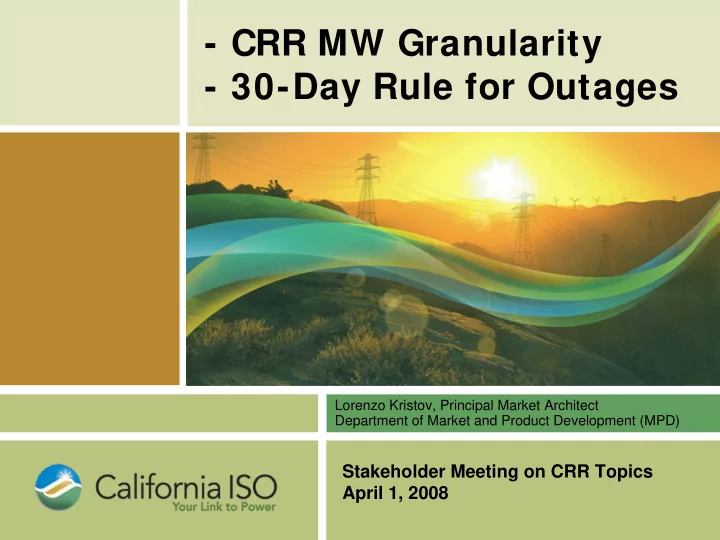

- CRR MW Granularity - 30-Day Rule for Outages Lorenzo Kristov, Principal Market Architect Department of Market and Product Development (MPD) Stakeholder Meeting on CRR Topics April 1, 2008
MW Granularity (Minimum Denomination) of CRR Awards Per original design and approved MRTU Tariff, minimum denomination of CRRs is 0.1 MW. The 0.1 MW minimum may not be sufficiently granular for purposes of: � Decomposition of CRRs sourced at Trading Hubs in the CRR Allocation process � Transfers of CRRs to reflect load migration. Problem: Calculated CRR quantities less than 0.05 MW will be rounded off to zero � Problem is proportionately more severe for smaller initial CRR MW quantities. CAISO committed to modify CRR system for CRR Year 2 to track smaller CRR denominations. April 1, 2008 – Stakeholder Meeting on CRR Topics 2
What level of CRR granularity is optimal? Finer granularity (smaller minimum denomination) means � Less reduction in allocated CRR quantities when Trading Hub sources are nominated � Greater accuracy in transferring CRRs for load migration. BUT … Finer granularity also means much higher volume of transactions and calculations for: � CRR holdings registered in SRS � CRR Holder credit requirements � CRR settlements. April 1, 2008 – Stakeholder Meeting on CRR Topics 3
Optimal CRR Granularity Example of increased accuracy: � 15 MW CRR nomination sourced at NP15 Trading Hub, decomposed into 400+ individual PNodes � Full 15 MW is feasible, but smaller total quantity is allocated due to rounding of small fractional quantities to zero � 0.1 MW granularity => 7.2 MW (48%) awarded � 0.01 MW granularity => 13.73 MW (91.5%) awarded � 0.001 MW granularity => 14.99 MW (99.9%) awarded April 1, 2008 – Stakeholder Meeting on CRR Topics 4
30-Day Rule on Outage Scheduling Three topics to be discussed: 1. Exemptions for outages of 24 hours or less duration 2. General provisions for assessing and granting PTO exemption requests 3. Process for evaluating effectiveness of 30-day rule provisions after MRTU start-up and considering revisions to the requirements based on experience NOTE: FERC 3/24/08 Order on BPMs requires CAISO to include in Tariff the policies for granting exemptions to the 30-Day Rule. April 1, 2008 – Stakeholder Meeting on CRR Topics 5
Change to 30-Day Rule Exemptions 30-Day Rule requires PTOs to schedule “significant outages” with CAISO at least 30 days prior to the month in which the outage will occur � “Significant outages” are those which present a risk of adverse impacts on CRR revenue adequacy � Defined in BPM on Outage Management in terms of type of facility, and duration of planned outage. Permitted flexibility: � Outages planned to occur within 1 calendar day are exempt � Outages scheduled 30 days in advance can be rescheduled within same month with 72-hour advance approval � Restricted maintenance activities per OP E-509A are exempt. Proposed change: � Outages planned to occur within a 24-hour period are exempt. � Change would not alter maximum duration of exempt outages. April 1, 2008 – Stakeholder Meeting on CRR Topics 6
Policies on Granting Exemptions CRR BPM Sec. 10.3.1 provides process for PTOs to submit facilities they wish to exempt from 30-Day Rule. Criteria for granting exemptions are based on the “Revenue Adequacy Theorem” � Outage must have no impact on shift factors or constraint limits in the FNM � PTO must provide demonstration when submitting proposed exemption to CAISO for approval. Rationale for these exemption criteria for start-up � Conservative - CAISO must balance competing objectives: • Release as many CRRs as possible • Minimize risk of CRR revenue inadequacy on measured demand � Theoretical - Absent operating experience with LMP market, CAISO cannot empirically estimate impact of specific outages on CRR revenue adequacy. April 1, 2008 – Stakeholder Meeting on CRR Topics 7
Future Changes to Exemption Criteria Each month, the end-of-month balance in CRR Balancing Account reflects success of monthly outage modeling and 30-day rule in balancing the two objectives: � Positive balance => more CRRs could have been released � Negative balance => revenue inadequacy occurred. Approximately 6 months after MRTU start-up, CAISO will begin empirical assessment of effectiveness of outage modeling approach and 30-day rule � Develop empirical basis for granting 30-day rule exemptions � Consider potential modifications to exemption policy after 12 months of market operation under LMP. After MRTU start-up CAISO will propose analytical methodology for discussion with stakeholders. April 1, 2008 – Stakeholder Meeting on CRR Topics 8
Recommend
More recommend